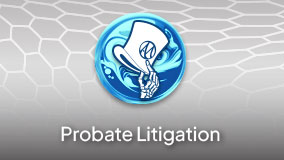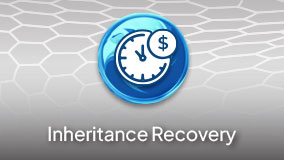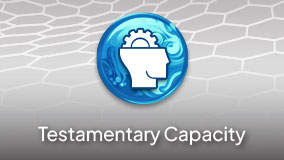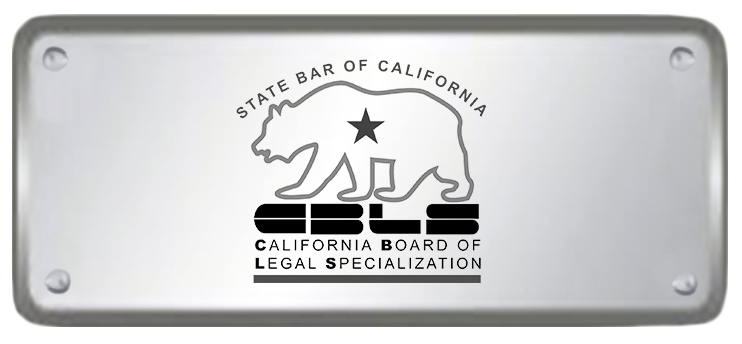WILL/TRUST CONTESTS IN CALIFORNIA
A will or trust contest in California refers to the legal process of challenging the validity or terms of a deceased person’s estate plan. When someone passes away and their estate is distributed according to their will or trust, interested parties, such as beneficiaries or potential heirs, may feel that the will does not accurately reflect the deceased person’s intentions or that it is invalid for various reasons. Contesting a will or trust allows individuals to raise objections and seek a resolution through the California probate court system.
What Are the Legal Grounds to Contest a Will in California?
To contest a will or trust, you must have legal grounds, which means you need a valid reason recognized by California law. Common grounds for contesting a will include:
LACK OF TESTAMENTARY CAPACITY:
This means the deceased person did not have the mental capacity to understand the nature and consequences of creating a will or trust.
UNDUE INFLUENCE:
This refers to situations where someone exerted excessive pressure or manipulation on the deceased person to draft or modify the will or trust in their favor.
FRAUD OR FORGERY:
If there is evidence to suggest that the will or trust was procured through fraudulent means or that the deceased person’s signature was forged, it may be grounds for contesting.
IMPROPER EXECUTION:
A will must meet specific requirements under California law, such as being in writing, signed by the testator (the person making the will) and witnessed by two competent individuals. If these formalities were not properly followed, the will may be contested. Trusts have similar requirements that must be complied with for the document to be considered valid.
REVOCATION:
If a more recent will or trust exists or there is evidence that the deceased person intended to revoke the existing will or trust, a contest may be initiated arguing that the purported document has been revoked and is no longer controlling.
STANDING TO CONTEST:
Only interested parties have standing to contest a will or. In California, interested parties typically include beneficiaries named in the current or prior will or trust, intestate heirs (those who would inherit under California law if there was no will), and individuals who had a legitimate expectation of inheritance but were excluded or inadequately provided for in the will.
TIME LIMIT:
There is a specific time limit for filing a will contest in California. Generally, a Trust contest must be filed within 120 days from the date the documents were provided to the beneficiaries. However, certain exceptions may extend or shorten this timeframe, so it’s important to consult with an attorney to understand the specific deadlines in your case. Various time line limitations occur when a will is submitted to probate requiring objections to be filed before a Court finds it to be a valid will.
PROBATE COURT PROCESS:
Contesting a will involves filing a petition with the probate court, which initiates the legal proceedings. The court will schedule a hearing to consider the evidence and arguments presented by both sides. The burden of proof rests with the person contesting the will, who must demonstrate the grounds for contesting and provide evidence to support their claim. The court will make a decision based on the evidence and applicable California law.
MEDIATION OR SETTLEMENT:
In some cases, the parties involved may choose to engage in mediation or negotiate a settlement to resolve the dispute outside of court. This can help avoid lengthy and costly litigation, allowing the interested parties to reach a mutually acceptable resolution.
How Can an Attorney Help Me Contest a Will in California?
Contesting a will in California can be a complex and challenging process, requiring the expertise of an attorney who specializes in probate and estate litigation. Our experienced attorneys at Antonyan Miranda can provide valuable assistance in several ways, including:
LEGAL EXPERTISE:
Our attorneys knowledgeable in California probate laws and the specific requirements for contesting a will can guide you through the process. We can analyze your case, assess the merits of your claim, and provide an informed opinion on the likelihood of success.
GATHERING ADVICE:
Contesting a will often involves gathering evidence to support your claim. Our attorneys can help you identify and obtain the necessary documents, such as medical records, financial statements, or witness statements, to strengthen your case.
PREPARING AND FILING THE PETITION:
Initiating a will contest requires filing a formal written petition with the probate court. Our attorneys can assist you in drafting and filing the petition, ensuring it complies with the court’s requirements and includes all necessary allegations and supporting evidence.
REPRESENTATION IN COURT:
Our attorneys will represent you throughout the legal proceedings, advocating for your interests in court hearings, settlement conferences, and mediation sessions. We will present your arguments, cross-examine witnesses, and protect your rights during the trial.
NEGOTIATION AND SETTLEMENT:
In some cases, it may be possible to resolve the dispute through negotiation or settlement. Our attorneys skilled in alternative dispute resolution can help you explore these options, negotiate on your behalf, and work towards a favorable resolution without the need for a trial.
BURDEN OF PROOF AND LEGAL STRATEGY:
Contesting a will often involves meeting the burden of proof to establish the grounds for invalidating the will. Our attorneys can develop a legal strategy tailored to your case, gathering evidence, interviewing witnesses, and presenting a compelling argument to meet the burden of proof.
KNOWLEDGE OF COURT PROCEDURES:
Navigating the legal process and court procedures can be overwhelming, especially for individuals without legal experience. Our attorneys familiar with the probate court system can ensure that all necessary documents are filed within deadlines, attend hearings on your behalf, and guide you through the process step by step.
PROTECTING YOUR RIGHTS:
By representing your interests, our attorneys can protect your legal rights throughout the contestation process. We will ensure that you are treated fairly, that due process is followed, and that your voice is heard in court.
Contesting a will is a complex and sensitive matter. Engaging the services of the skilled probate attorneys at Antonyan Miranda can provide you with the necessary legal support and guidance to navigate the process effectively and increase your chances of a successful outcome. At Antonyan Miranda, we aggressively advocate for your interests at trial, using all available legal tools and strategies to help secure all that is important to you. Call us at 619-255-7744 to speak with one of our Concierge attorneys or visit us at www.expertprobatelaw.com for more information.
FOLLOW US!
WILL/TRUST CONTESTS IN CALIFORNIA
A will or trust contest in California refers to the legal process of challenging the validity or terms of a deceased person’s estate plan. When someone passes away and their estate is distributed according to their will or trust, interested parties, such as beneficiaries or potential heirs, may feel that the will does not accurately reflect the deceased person’s intentions or that it is invalid for various reasons. Contesting a will or trust allows individuals to raise objections and seek a resolution through the California probate court system.
What Are the Legal Grounds to Contest a Will in California?
To contest a will or trust, you must have legal grounds, which means you need a valid reason recognized by California law. Common grounds for contesting a will include:
LACK OF TESTAMENTARY CAPACITY:
This means the deceased person did not have the mental capacity to understand the nature and consequences of creating a will or trust.
UNDUE INFLUENCE:
This refers to situations where someone exerted excessive pressure or manipulation on the deceased person to draft or modify the will or trust in their favor.
FRAUD OR FORGERY:
If there is evidence to suggest that the will or trust was procured through fraudulent means or that the deceased person’s signature was forged, it may be grounds for contesting.
IMPROPER EXECUTION:
A will must meet specific requirements under California law, such as being in writing, signed by the testator (the person making the will) and witnessed by two competent individuals. If these formalities were not properly followed, the will may be contested. Trusts have similar requirements that must be complied with for the document to be considered valid.
REVOCATION:
If a more recent will or trust exists or there is evidence that the deceased person intended to revoke the existing will or trust, a contest may be initiated arguing that the purported document has been revoked and is no longer controlling.
STANDING TO CONTEST:
Only interested parties have standing to contest a will or. In California, interested parties typically include beneficiaries named in the current or prior will or trust, intestate heirs (those who would inherit under California law if there was no will), and individuals who had a legitimate expectation of inheritance but were excluded or inadequately provided for in the will.
TIME LIMIT:
There is a specific time limit for filing a will contest in California. Generally, a Trust contest must be filed within 120 days from the date the documents were provided to the beneficiaries. However, certain exceptions may extend or shorten this timeframe, so it’s important to consult with an attorney to understand the specific deadlines in your case. Various time line limitations occur when a will is submitted to probate requiring objections to be filed before a Court finds it to be a valid will.
PROBATE COURT PROCESS:
Contesting a will involves filing a petition with the probate court, which initiates the legal proceedings. The court will schedule a hearing to consider the evidence and arguments presented by both sides. The burden of proof rests with the person contesting the will, who must demonstrate the grounds for contesting and provide evidence to support their claim. The court will make a decision based on the evidence and applicable California law.
MEDIATION OF SETTLEMENT:
In some cases, the parties involved may choose to engage in mediation or negotiate a settlement to resolve the dispute outside of court. This can help avoid lengthy and costly litigation, allowing the interested parties to reach a mutually acceptable resolution.
How Can an Attorney Help Me Contest a Will in California?
Contesting a will in California can be a complex and challenging process, requiring the expertise of an attorney who specializes in probate and estate litigation. Our experienced attorneys at Antonyan Miranda can provide valuable assistance in several ways, including:
LEGAL EXPERTISE:
Our attorneys knowledgeable in California probate laws and the specific requirements for contesting a will can guide you through the process. We can analyze your case, assess the merits of your claim, and provide an informed opinion on the likelihood of success.
GATHERING EVIDENCE:
Contesting a will often involves gathering evidence to support your claim. Our attorneys can help you identify and obtain the necessary documents, such as medical records, financial statements, or witness statements, to strengthen your case.
PREPARING AND FILING THE PETITION:
Initiating a will contest requires filing a formal written petition with the probate court. Our attorneys can assist you in drafting and filing the petition, ensuring it complies with the court’s requirements and includes all necessary allegations and supporting evidence.
REPRESENTATION IN COURT:
Our attorneys will represent you throughout the legal proceedings, advocating for your interests in court hearings, settlement conferences, and mediation sessions. We will present your arguments, cross-examine witnesses, and protect your rights during the trial.
NEGOTIATION AND SETTLEMENT:
In some cases, it may be possible to resolve the dispute through negotiation or settlement. Our attorneys skilled in alternative dispute resolution can help you explore these options, negotiate on your behalf, and work towards a favorable resolution without the need for a trial.
BURDEN OF PROOF AND LEGAL STRATEGY:
Contesting a will often involves meeting the burden of proof to establish the grounds for invalidating the will. Our attorneys can develop a legal strategy tailored to your case, gathering evidence, interviewing witnesses, and presenting a compelling argument to meet the burden of proof.
KNOWLEDGE OF COURT PROCEDURES:
Navigating the legal process and court procedures can be overwhelming, especially for individuals without legal experience. Our attorneys familiar with the probate court system can ensure that all necessary documents are filed within deadlines, attend hearings on your behalf, and guide you through the process step by step.
PROTECTING YOUR RIGHTS:
By representing your interests, our attorneys can protect your legal rights throughout the contestation process. We will ensure that you are treated fairly, that due process is followed, and that your voice is heard in court.
Contesting a will is a complex and sensitive matter. Engaging the services of the skilled probate attorneys at Antonyan Miranda can provide you with the necessary legal support and guidance to navigate the process effectively and increase your chances of a successful outcome. At Antonyan Miranda, we aggressively advocate for your interests at trial, using all available legal tools and strategies to help secure all that is important to you. Call us at 619-255-7744 to speak with one of our Concierge attorneys or visit us at www.expertprobatelaw.com for more information.


























